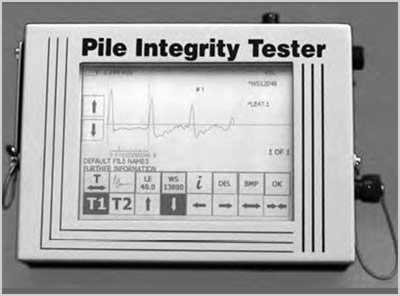This method involves generation of a low stress wave with the help of a specialized hand held hammer. The waves are then collected in acceleration form by an accelerometer and integrated to velocity for further analysis. The accelerations generated by the impact are measured by the accelerometer attached on the pile top and are converted to velocity form for display onto the collector screen. Reflections from pile toe/pile discontinuities, cross-sectional changes, soil resistance changes, the wave speed through the pile etc., are graphically displayed. Since the strains during the test are of extremely low magnitude, the method is known as Low Strain Test method.
|
 |
|
| APPLICATIONS & BENEFITS |
- The test is fast, economical and reliable and gives information regarding the pile’s suitability
- Helps locate pile defects and its location and ascertain concrete quality
- Applicable for piles of flyovers, bridges, jetties, multi-storey buildings or where pile integrity is questionable
- In some cases where testing can be done from top of a pile cap, it may be possible to evaluate integrity of existing piles used for bridges, flyovers, buildings and other structures
- With some information about the soil and the pile, it can be used to ascertain pile length within a range of +/- 5% to 10%
|
| LIMITATIONS |
- It cannot be used for steel H or pipe piles as the equipment is not calibrated for it
- The test cannot be generally used for pre-cast jointed piles beyond the first segment as the wave gets reflected from the first joint
- Testing micro piles is difficult and most of the times not possible due to presence of high percentage reinforcement that affect the signal
|
| |
| |
|
|